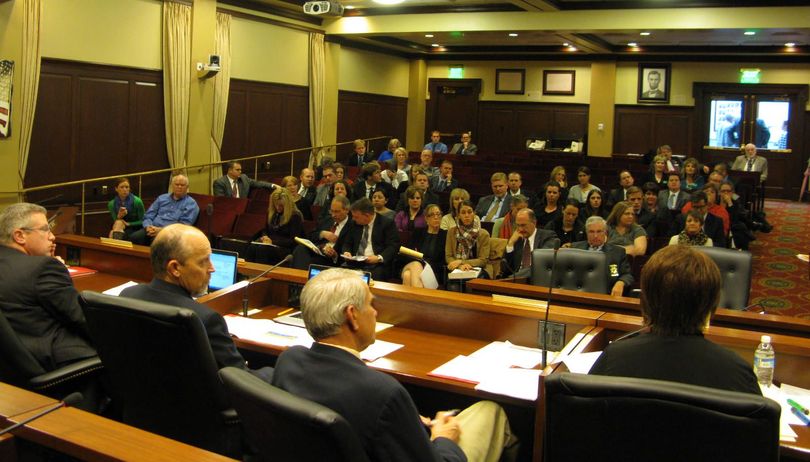Justice reinvestment bill sparks debate, concerns from prosecutors

The criminal justice reinvestment bill – the measure to start the work outlined by an interim study committee and task force that worked with the Justice Center of the Council for State Governments and the Pew Trusts – is up for a hearing before the Senate Judiciary Committee this afternoon. The plan calls for investing $33 million over the next five years to achieve savings of more than $280 million, by beefing up probation and parole programs, moving non-violent offenders more quickly through the system, and reserving prison cells for riskier offenders. The idea is to slow the growth in Idaho’s prison population, reduce recidivism, and save money. This year’s bill, SB 1331, makes the first steps toward that plan; it carries a price tag of just over $2 million, while the five-year plan outlined $5.5 million in costs for the first year. That's because another $2.5 million is allocated in the governor's budget recommendation for the Department of Correction to boost community treatment, plus additional funds for probation and parole officers, bringing the total up to the full amount.
Canyon County Prosecutor Bryan Taylor was first up to testify, and he raised concerns that the changes could jeopardize the safety of the public. “I agree completely with putting money and resources into probation and parole,” Taylor told the lawmakers. But he raised questions about the line the bill draws between violent and non-violent offenders. “There’s numerous felonies … that aren’t even constituted as violent offenses under that category,” he said, “stalking offenses, no-contact order violations, injury to children, attempted strangulation, aggravated DUI. … This exposes our community, I think, to great jeopardy in public safety.” He said, “My primary concern is messing around with our current sentencing guidelines, our sentencing structure, which I think this bill does.”
David High spoke next. A retired longtime deputy Idaho attorney general, he said he has a son who became addicted to drugs when he was in the 7th grade, and has been to prison three times in the past 25 years. “We have therefore seen the prison system from a different point of view,” he said. High noted that he and his wife Lindy submitted a proposal to the interim committee that largely tracks with the justice reinvestment plan. “If you can reduce recidivism, that is where you improve public safety – they are one and the same,” High said. “The policies in this bill reduce recidivism, improve public safety. That’s what all the evidence says.”
High said during his career, and for many in law enforcement, “The assumption was that it would not be a good thing to reduce the amount of the fixed portion of a sentence and have more parole. But the national statistics prove the exact opposite. The earlier a person got out after he had completed his educational program, and completed the fixed portion of his sentence, the lower the recidivism, when you do the parole system. These are shocking things, I think, to people in the law enforcement community, but they are the facts, and we must act on the facts.”
Twin Falls Prosecutor Grant Loebs said he agreed with Taylor, and supports many parts of the plan, but not all. Loebs disputed that Idaho really has the nation's 8th highest incarceration rate. "Idaho has a unique system. We have a rider system in this state, which was specifically designed by the Legislature to be an alternative to prison. It is not prison," he said. "The CSG data puts all of those people in your prison population. If you subtract that ... Idaho is not anywhere near 8th. We need to compare apples to apples, and we cannot really do that, because no other state has that system." Idaho's "rider" system sends offenders to an intensive program behind bars for a short period, and if they pass, they get out on probation; if they fail, they head to prison for their full term. The justice reinvestment study counted only the time that riders are in custody as part of Idaho's incarceration rate, not time they are out on probation. Loebs said he believes SB 1331 will release people who shouldn't be released. "I am alarmed," he said. "I believe that this is dangerous legislation as written."
